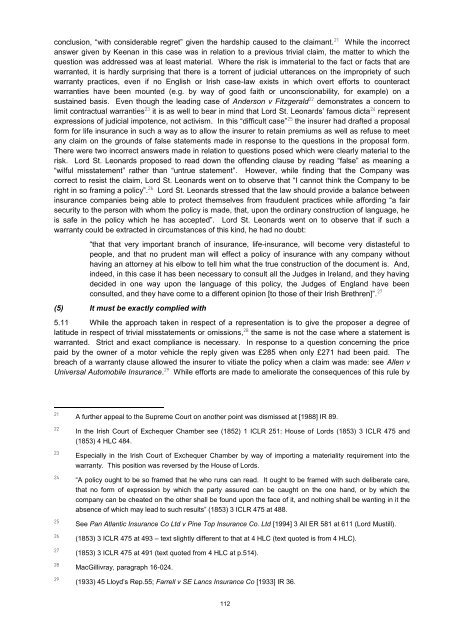Insurance Contracts CP - Law Reform Commission
Insurance Contracts CP - Law Reform Commission
Insurance Contracts CP - Law Reform Commission
Create successful ePaper yourself
Turn your PDF publications into a flip-book with our unique Google optimized e-Paper software.
conclusion, ―with considerable regret‖ given the hardship caused to the claimant. 21 While the incorrect<br />
answer given by Keenan in this case was in relation to a previous trivial claim, the matter to which the<br />
question was addressed was at least material. Where the risk is immaterial to the fact or facts that are<br />
warranted, it is hardly surprising that there is a torrent of judicial utterances on the impropriety of such<br />
warranty practices, even if no English or Irish case-law exists in which overt efforts to counteract<br />
warranties have been mounted (e.g. by way of good faith or unconscionability, for example) on a<br />
sustained basis. Even though the leading case of Anderson v Fitzgerald 22 demonstrates a concern to<br />
limit contractual warranties 23 it is as well to bear in mind that Lord St. Leonards‘ famous dicta 24 represent<br />
expressions of judicial impotence, not activism. In this ―difficult case‖ 25 the insurer had drafted a proposal<br />
form for life insurance in such a way as to allow the insurer to retain premiums as well as refuse to meet<br />
any claim on the grounds of false statements made in response to the questions in the proposal form.<br />
There were two incorrect answers made in relation to questions posed which were clearly material to the<br />
risk. Lord St. Leonards proposed to read down the offending clause by reading ―false‖ as meaning a<br />
―wilful misstatement‖ rather than ―untrue statement‖. However, while finding that the Company was<br />
correct to resist the claim, Lord St. Leonards went on to observe that ―I cannot think the Company to be<br />
right in so framing a policy‖. 26 Lord St. Leonards stressed that the law should provide a balance between<br />
insurance companies being able to protect themselves from fraudulent practices while affording ―a fair<br />
security to the person with whom the policy is made, that, upon the ordinary construction of language, he<br />
is safe in the policy which he has accepted‖. Lord St. Leonards went on to observe that if such a<br />
warranty could be extracted in circumstances of this kind, he had no doubt:<br />
―that that very important branch of insurance, life-insurance, will become very distasteful to<br />
people, and that no prudent man will effect a policy of insurance with any company without<br />
having an attorney at his elbow to tell him what the true construction of the document is. And,<br />
indeed, in this case it has been necessary to consult all the Judges in Ireland, and they having<br />
decided in one way upon the language of this policy, the Judges of England have been<br />
consulted, and they have come to a different opinion [to those of their Irish Brethren]‖. 27<br />
(5) It must be exactly complied with<br />
5.11 While the approach taken in respect of a representation is to give the proposer a degree of<br />
latitude in respect of trivial misstatements or omissions, 28 the same is not the case where a statement is<br />
warranted. Strict and exact compliance is necessary. In response to a question concerning the price<br />
paid by the owner of a motor vehicle the reply given was £285 when only £271 had been paid. The<br />
breach of a warranty clause allowed the insurer to vitiate the policy when a claim was made: see Allen v<br />
Universal Automobile <strong>Insurance</strong>. 29 While efforts are made to ameliorate the consequences of this rule by<br />
21<br />
22<br />
23<br />
24<br />
25<br />
26<br />
27<br />
28<br />
29<br />
A further appeal to the Supreme Court on another point was dismissed at [1988] IR 89.<br />
In the Irish Court of Exchequer Chamber see (1852) 1 ICLR 251: House of Lords (1853) 3 ICLR 475 and<br />
(1853) 4 HLC 484.<br />
Especially in the Irish Court of Exchequer Chamber by way of importing a materiality requirement into the<br />
warranty. This position was reversed by the House of Lords.<br />
―A policy ought to be so framed that he who runs can read. It ought to be framed with such deliberate care,<br />
that no form of expression by which the party assured can be caught on the one hand, or by which the<br />
company can be cheated on the other shall be found upon the face of it, and nothing shall be wanting in it the<br />
absence of which may lead to such results‖ (1853) 3 ICLR 475 at 488.<br />
See Pan Atlantic <strong>Insurance</strong> Co Ltd v Pine Top <strong>Insurance</strong> Co. Ltd [1994] 3 All ER 581 at 611 (Lord Mustill).<br />
(1853) 3 ICLR 475 at 493 – text slightly different to that at 4 HLC (text quoted is from 4 HLC).<br />
(1853) 3 ICLR 475 at 491 (text quoted from 4 HLC at p.514).<br />
MacGillivray, paragraph 16-024.<br />
(1933) 45 Lloyd‘s Rep.55; Farrell v SE Lancs <strong>Insurance</strong> Co [1933] IR 36.<br />
112

















